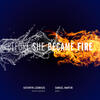Before She Became Fire
Kathryn Leemhuis, mezzo-soprano
Samuel Martin, piano
In this album, we present a collection of remarkable compositions for mezzo-soprano voice and piano, showcasing the artistry of contemporary women composers who have graced the current classical music scene. Through these distinctive works, we delve into the intricacies of life, the bittersweet embrace of mortality, the resonance of legacy, and the strength born from vulnerability.
Lori Laitman’s two-song cycle, And Music Will Not End, sets the stage for our exploration of the human experience. The music weaves a tapestry of emotions as we contemplate existence, mortality, and the timeless question of legacy. While not part of the two-song cycle, a third song, titled “Presence,” is included in our performance as it, too, projects powerful themes of life and loss. The composer’s music as a whole invites listeners to ponder the cycle of life through the lens of the infinite, resonating with themes that transcend time and space.
Judith Cloud’s cycle, The Secret History of Water, draws inspiration from the delicate cadence of poetry and the captivating voice of female lyricist Sylvia Curbelo. The eight melodies ebb and flow, mirroring the lyrical intricacies that tell stories of strength and vulnerability. The poignant lyrics reveal the multifaceted nature of womanhood, capturing the essence of resilience amid challenges. This work is a tribute to the beauty of words, music, and the indomitable spirit of women.
Melissa Dunphy’s Four Poems of Nikita Gill embraces the contemporary landscape, speaking directly to the lives of young women today. Through the prism of diverse experiences, the four songs resonate with the myriad emotions that define this generation's journey. In an era marked by the Me Too movement, these compositions bear witness to the progress that has been made while acknowledging the challenges that persist. They stand as a testament to the strength and resilience of women in overcoming adversity.
In celebrating the voices of these three remarkable female composers, we underscore the importance of providing opportunities for creators who have historically been marginalized. Our album is a testament to the richness of female perspectives, the depth of their artistic expression, and the beauty of their musical narratives. By amplifying their voices, we contribute to a more inclusive and diverse musical landscape.
This album invites listeners to reflect on life, death, legacy, and the diverse journeys that shape us as individuals and as a society. Through the powerful marriage of voice and piano, these compositions offer a window into the souls of the composers and the universal experiences they encapsulate. May this collection inspire contemplation, empathy, and appreciation for the limitless spectrum of the female experience.

